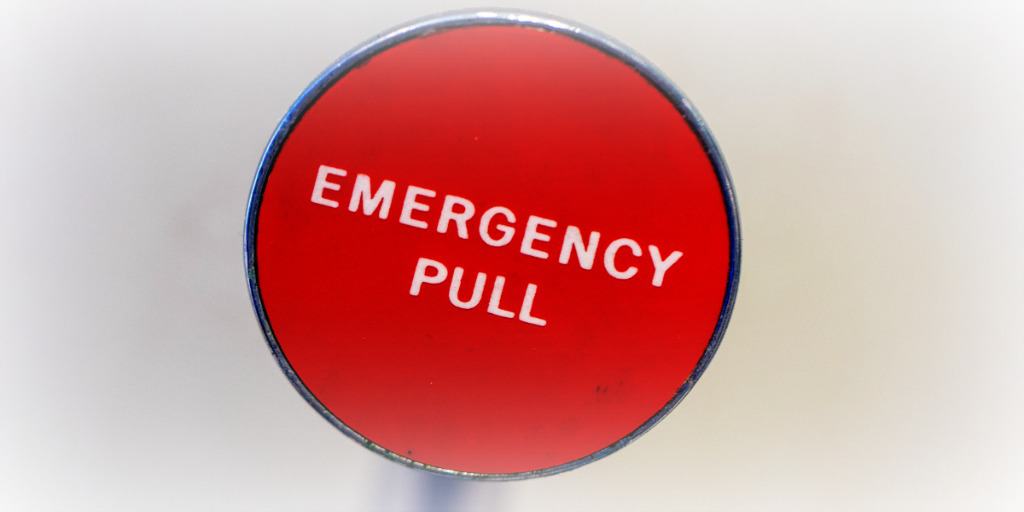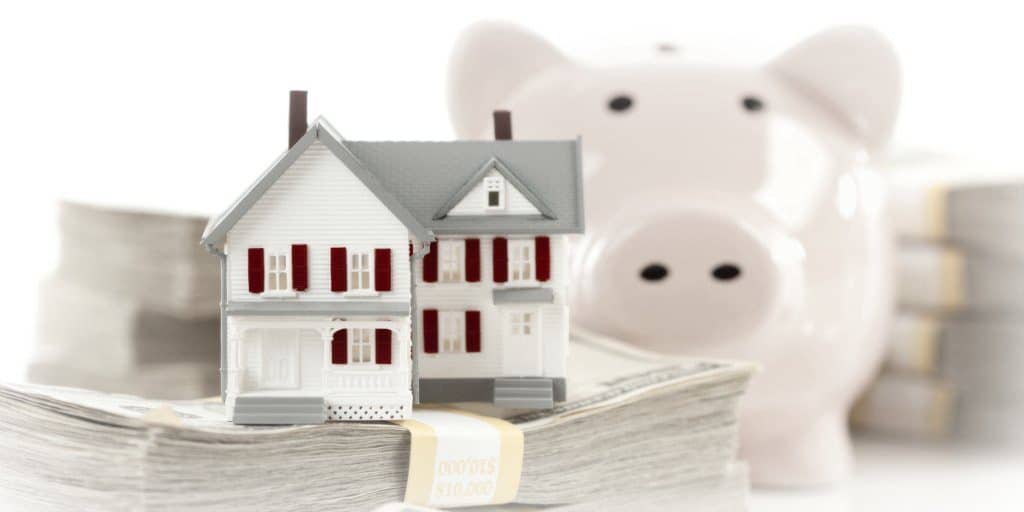Using HELOC as Emergency Fund: Is it a smart move?
(This page may contain affiliate links and we may earn fees from qualifying purchases at no additional cost to you. See our Disclosure for more info.)
Should you use a HELOC (home equity line of credit) as an emergency fund?
You may ask yourself that question after realizing how much equity you have in your home. Or after seeing what little interest an emergency fund earns in your savings account.
Using a HELOC for an emergency fund can allow you access to a large sum of money when you need it for unexpected expenses.
It also allows you to invest your current emergency savings for the future, rather than leaving it sitting in a savings account.
But there are plenty of drawbacks to using a HELOC as an emergency fund. Fees, closing costs, and variable interest rates come with most lines of credit.
Non-emergency spending can also be an issue. Lenders can reduce or cancel a HELOC in some circumstances and failing to make HELOC payments can lead to foreclosure.
Read on to learn more about using HELOCs as emergency funds. And why you need to proceed with caution if you’re considering using the equity in your home for a financial emergency.
Prepare for the Worst

If you’re lucky, you go about life without facing too many events you’d call true emergencies. But even the most “glass half-full” adults understand the phrase hoping for the best has an important ending…preparing for the worst.
For many people, that preparation involves saving at least 3-6 months of expenses in an emergency fund, maybe even more.
Many factors influence how much money people put in their emergency funds to cover their emergency budget.
Their level of debt, the stability of their job, the number and health of those living in the household, and the amount and access to other funds to pay for emergency medical expenses or another expensive crisis situation may all come into play.
We want emergency funds because they allow a level of control over emergencies not in our control.
And whether you're risk-averse or not, having money to pay for things in crisis matters.
It allows you to focus on the emergency, not the money – and that’s priceless.
Where Do People Keep Emergency Funds?
Traditional advice suggests keeping emergency funds in a savings account so you have fast access to cash.
Many of those emergency funds are now held in online savings accounts offering higher interest rates than a brick-and-mortar bank provides.
Others choose to use money market accounts for slightly higher interest rates.
Or they pick no penalty Certificates of Deposit (CD’s) or “ladder” CD’s so they have access to penalty-free funds maturing at different times.
A Roth IRA is another option people consider because you can withdraw contributed funds penalty-free when facing a financial emergency.
What About Using Equity in My Home Instead?
Some people have trouble saving large sums of money.
Others hate seeing their cash sitting in a savings account not invested in the stock market or used to purchase other assets like rental properties.
But they may have equity in their home and would prefer to tap into it in the event of an unanticipated major expense.
Since a Home Equity Line of Credit or HELOC provides a homeowner with a revolving line of credit, they often pay for large expenses using the equity in their home. (Not to be confused with a home equity loan, which is a type of installment loan versus a line of credit.)
Paying for home renovations or college tuition for kids are examples of when HELOCs are used.
You're given a certain spending limit, and pay back whatever you borrow, with interest. Similar to a credit card. If you don’t use the money from the line of credit, you won't have a loan payment.
That’s what many people think about when they consider using a HELOC as their emergency fund.
They'll still have access to a sum of money to help them survive a financial emergency. But they don’t have to use it.
They also won’t have cash just sitting in an account waiting for a bad thing to happen.
But there’s definitely a difference between emergency funds and equity loans. One is using a surplus of money, and the other requires taking on debt.
Does that mean taking a HELOC as your emergency fund is never a good idea?
Never isn’t a word we use much in personal finance. That’s because so many things depend on your specific situation.
Let’s consider the pros and cons of using a HELOC to determine who they could work for. And who should keep setting aside cash to fund future emergencies instead.

Benefits of Using a HELOC
It’s important to understand the advantages of using a HELOC as an emergency fund to determine if the strategy is a smart move for you.
1. Quick Access to Large Sum of Money
HELOC’s limits are generally set at 80-85% of the home's current market value. Minus the amount of the current mortgage balance on the home.
Should your house appraise for $250,000 with an existing mortgage of $150,000, you can likely apply for a line of credit of at least 80% of the $100,000 you have in equity – or $80,000.
With monthly expenses of $5,000, the HELOC will provide far more than the 3-6 months of living expenses you have saved in an emergency fund.
If you set up a HELOC before you need it, you’ll be able to access your money fast. (It typically takes a 2-4 week period of time (sometimes longer) for a HELOC to process.)
2. Can Invest Current Emergency Funds for Other Financial Goals
If you were to save 3-6 months of expenses (at $5,000/month) for your emergency fund, you’d have between $15,000 – $30,000 in an account.
While it could be earning some interest, you may be looking for much higher returns than you’ll see in typical accounts used for emergency funds.
Your emergency funds can be more aggressively invested to earn higher returns possible.
You could also use those funds for the down payment on a rental property if that's in your wealth-building plan.
3. May Never Need to Access the HELOC
The need to access your HELOC can depend on the type of crisis you face when an emergency happens, and the extra expenses you’ll have in dealing with the situation.
If you're employed, you may be able to cash-flow critical events without tapping your HELOC. Plus, even if you do use your HELOC, you might be able to quickly pay off what you borrowed, without paying much interest.
Looking at these advantages, having access to a HELOC and skipping an emergency fund might make sense. But you’ll want to read on and consider the negatives about HELOC’s too.
4. Lower Interest Rate Than Other Debt
Home equity lines of credit typically come with a lower interest rate (4-5% range on average) than a personal loan or credit card debt, making them more cost-effective than other high-interest debt options when you need to borrow money.
While any debt should be taken on with caution and a plan to pay it off, in terms of the potential costs of a loan the HELOC is preferred over other types of loans (with the possible exception of a cash-out refinance mortgage loan) when there's very minimal risk of you losing your home for nonpayment.
Drawbacks of Using a HELOC as an Emergency Fund
You also need to be aware of the disadvantages of HELOCs if you're considering using the equity in your home for emergency expenses.
1. Fees and Closing Costs for Opening HELOC
You might consider the equity you have in your home as your money, but accessing the funds will likely cost you.
You'll typically pay a bank, credit union, or another lender, for an appraisal of your home, along with origination and annual fees for the line of credit. Depending on where you live, there may be additional closing costs to pay too.
Understanding the terms of the HELOC is essential. The credit limit you're offered, the draw period (often 10 years), the repayment period (10-20 years), and the interest rate you pay may depend on your income, debt-to-income ratio, credit score, and credit history, among other factors.
2. Temptation to Use for Non-Emergencies
Spending money from an emergency fund reduces what you've saved but spending money from a HELOC adds to your debt.
Unless you can be sure you won’t take a vacation, buy all new furniture, or start remodeling projects with your HELOC – don’t use a HELOC as an emergency fund.
3. Roof Over Your Head is the Collateral
When using a HELOC as an emergency fund and you do have a crisis, you still have to be able to pay what you borrow.
If the emergency involves you or another person who contributes to your household income, will you be able to pay all of your bills and make the monthly payment on the HELOC consistently?
If you can access other funds during an expensive medical event or long-term situation where you can’t work, it might not be a problem.
But don’t underestimate the financial stress you could be under trying to make minimum payments on a HELOC in addition to your regular mortgage payment and all your other bills.
Knowing your house could face foreclosure may have you re-thinking whether putting money into an emergency fund is a better option in your situation.
4. Variable Interest Rates and Possibility of HELOC Reduction or Cancellation
Most HELOCs have a variable rate of interest that can change from month to month. While low now interest rates can rise at any time.
Even though it doesn’t happen often, a financial institution can also reduce or cancel a HELOC.
If your house value falls significantly or if there's a financial crisis like a recession, you may have more than one emergency on your hand.
The equity in your house may drop, and you may face another financial stress like a job loss.
What happens if you then have an emergency event like a medical crisis on top of everything?
This may make it very difficult to access your HELOC or meet the repayment term requirements for the money you’ve borrowed on it.
Is it Smart to use a HELOC as an Emergency Fund?
There are some definite benefits from putting your money to work to grow your wealth. But there are serious risks to also consider.
If you do decide to use a HELOC for emergencies, you may still want to save some cash to avoid using this type of loan for smaller issues.
That savings may also come in handy to help make loan payments on the HELOC if you do borrow money.
You should also decide ahead of time what constitutes an emergency and when you would use your line of credit to borrow additional funds.
If you have a partner, discuss the pros and cons of saving an emergency fund vs. taking out a HELOC. Make sure you're on the same page with the financial decisions you make.
Some people have strong feelings about taking on debt when you can save for an emergency.
If you’ve educated yourself and understand the loan terms for the HELOC and are willing to accept the financial risks associated with using it for a financial emergency, a HELOC may make sense for you.

Written by Women Who Money Cofounders Vicki Cook and Amy Blacklock.
Amy and Vicki are the coauthors of Estate Planning 101, From Avoiding Probate and Assessing Assets to Establishing Directives and Understanding Taxes, Your Essential Primer to Estate Planning, from Adams Media.
